2020年普通高中新高考山东卷Ⅰ英语高考真题试卷试题
精品解析:2020年山东省高考英语试卷(新高考全国Ⅰ卷)(原卷版)

2020年普通高等学校招生全国统一考试英语第一部分听力(共两节,满分30分)第一节 (共5小题;每小题1.5分,满分7.5分)1.What is the woman waiting to do?A.Go to a local concert.B.Watch a TV program.C.Finish her homework.2.What are the speakers mainly talking about?A.The weather of this summer.B.A plan for the coming summer.C.The environmental protection.3.What is the woman doing now?A.Painting a picture.B.Drinking hot water.C.Repairing her brush.4.How far is the nearest hotel?A.Eight kilometers away.B.Five kilometers away.C.Three kilometers away.5.What is the probable relationship between the speakers?A.Manager and chefB.Guide and traveler.C.Waiter and customer.第二节(共15小题;每小题1.5分,满分22.5分)听第6段材料,回答第6和第7两个小题。
6.Where are the cups?A.In the plastic bag.B.In the new basket.C.In the box with the plates.7.Why are the speakers unable to cook anything?A.They forgot the frying pan.B.They left their food behind.C.They couldn't get any water.听第7段材料,回答第8和第9两个小题。
2024年全国统一高考英语试卷(新课标Ⅰ卷)含答案
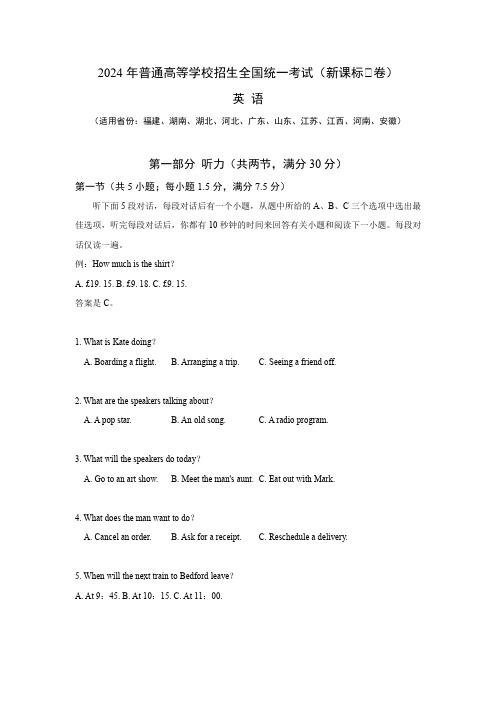
2024年普通高等学校招生全国统一考试(新课标Ⅰ卷)英语(适用省份:福建、湖南、湖北、河北、广东、山东、江苏、江西、河南、安徽)第一部分听力(共两节,满分30分)第一节(共5小题;每小题1.5分,满分7.5分)听下面5段对话,每段对话后有一个小题,从题中所给的A、B、C三个选项中选出最佳选项,听完每段对话后,你都有10秒钟的时间来回答有关小题和阅读下一小题。
每段对话仅读一遍。
例:How much is the shirt?A. £19. 15.B. £9. 18.C. £9. 15.答案是C。
1. What is Kate doing?A. Boarding a flight.B. Arranging a trip.C. Seeing a friend off.2. What are the speakers talking about?A. A pop star.B. An old song.C. A radio program.3. What will the speakers do today?A. Go to an art show.B. Meet the man's aunt.C. Eat out with Mark.4. What does the man want to do?A. Cancel an order.B. Ask for a receipt.C. Reschedule a delivery.5. When will the next train to Bedford leave?A. At 9:45.B. At 10:15.C. At 11:00.第二节(共15小题;每小题1.5分,满分22.5分)听下面5段对话或独白。
每段对话或独白后有几个小题,从题中所给的A、B、C三个选项中选出最佳选项。
听每段对话或独白前,你将有时间阅读各个小题,每小题5秒钟;听完后,各小题将给出5秒钟的作答时间。
2020年新高考英语全国卷1(山东)-答案
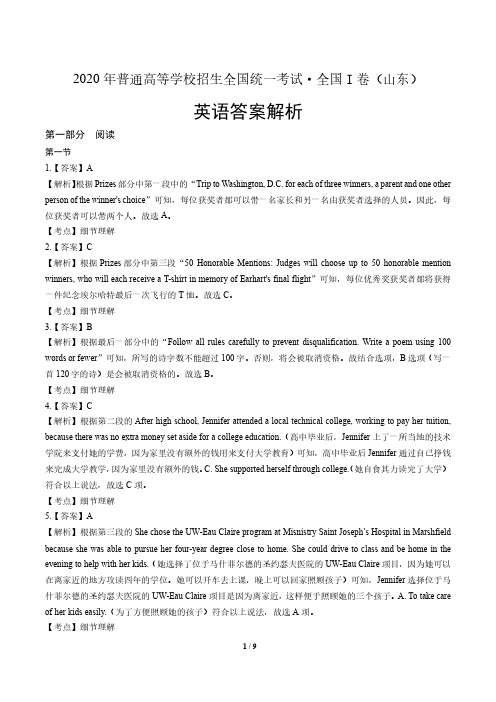
2020年普通高等学校招生全国统一考试·全国I卷(山东)英语答案解析第一部分阅读第一节1.【答案】A【解析】根据Prizes部分中第一段中的“Trip to Washington, D.C. for each of three winners, a parent and one other person of the winner's choice”可知,每位获奖者都可以带一名家长和另一名由获奖者选择的人员。
因此,每位获奖者可以带两个人。
故选A。
【考点】细节理解2.【答案】C【解析】根据Prizes部分中第三段“50 Honorable Mentions: Judges will choose up to 50 honorable mention winners, who will each receive a T-shirt in memory of Earhart's final flight”可知,每位优秀奖获奖者都将获得一件纪念埃尔哈特最后一次飞行的T恤。
故选C。
【考点】细节理解3.【答案】B【解析】根据最后一部分中的“Follow all rules carefully to prevent disqualification. Write a poem using 100 words or fewer”可知,所写的诗字数不能超过100字。
否则,将会被取消资格。
故结合选项,B选项(写一首120字的诗)是会被取消资格的。
故选B。
【考点】细节理解4.【答案】C【解析】根据第二段的After high school, Jennifer attended a local technical college, working to pay her tuition, because there was no extra money set aside for a college education.(高中毕业后,Jennifer上了一所当地的技术学院来支付她的学费,因为家里没有额外的钱用来支付大学教育)可知,高中毕业后Jennifer通过自己挣钱来完成大学教学,因为家里没有额外的钱。
2024年新课标全国ⅰ卷英语高考真题文档版(含答案)

2024年普通高等学校招生全国统一考试(新课标Ⅰ卷)英语学科姓名________________准考证号________________全卷共12页,满分150分,考试时间120分钟。
考生注意:1.答题前,请务必将自己的姓名、准考证号用黑色字迹的签字笔或钢笔分别填写在试题卷和答题纸规定的位置上。
2.答题时,请按照答题纸上“注意事项”的要求,在答题纸相应的位置上规范作答,在本试题卷上的作答一律无效。
第一部分听力(共两节,满分30分)做题时,先将答案标在试卷上。
录音内容结束后,你将有两分钟的时间将试卷上的答案转涂到答题纸上。
第一节(共5小题;每小题1.5分,满分7.5分)听下面5段对话。
每段对话后有一个小题,从题中所给的A、B、C三个选项中选出最佳选项。
听完每段对话后,你都有10秒钟的时间来回答有关小题和阅读下一小题。
每段对话仅读一遍。
例:How much is the shirt?A.£19.15.B.£9.18.C.£9.15.答案是C。
1.【此处可播放相关音频,请去附件查看】What is Kate doing?A.Boarding a flight.B.Arranging a trip.C.Seeing a friend off.2.【此处可播放相关音频,请去附件查看】What are the speakers talking about?A.A pop star.B.An old song.C.A radio program.3.【此处可播放相关音频,请去附件查看】What will the speakers do today?A.Go to an art show.B.Meet the man's aunt.C.Eat out with Mark.4.【此处可播放相关音频,请去附件查看】What does the man want to do?A.Cancel an order.B.Ask for a receipt.C.Reschedule a delivery.5.【此处可播放相关音频,请去附件查看】When will the next train to Bedford leave?A.At9:45.B.At10:15.C.At11:00.第二节(共15小题;每小题1.5分,满分22.5分)听下面5段对话或独白。
(精编)2020年高考英语试卷(全国新高考Ⅰ卷)
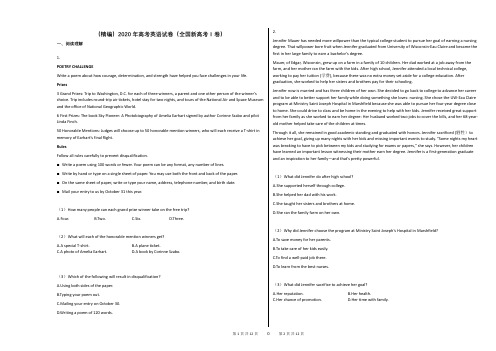
(精编)2020年高考英语试卷(全国新高考Ⅰ卷)一、阅读理解1.POETRY CHALLENGEWrite a poem about how courage, determination, and strength have helped you face challenges in your life.Prizes3 Grand Prizes: Trip to Washington, D.C. for each of three winners, a parent and one other person of the winner's choice. Trip includes round-trip air tickets, hotel stay for two nights, and tours of the National Air and Space Museum and the office of National Geographic World.6 First Prizes: The book Sky Pioneer: A Photobiography of Amelia Earhart signed by author Corinne Szabo and pilot Linda Finch.50 Honorable Mentions: Judges will choose up to 50 honorable mention winners, who will each receive a T-shirt in memory of Earhart's final flight.RulesFollow all rules carefully to prevent disqualification.■ Write a poem using 100 words or fewer. Your poem can be any format, any number of lines.■ Write by hand or type on a single sheet of paper. You may use both the front and back of the paper.■ On the same sheet of paper, write or type your name, address, telephone number, and birth date.■ Mail your entry to us by October 31 this year.(1)How many people can each grand prize winner take on the free trip?A.Four.B.Two.C.Six.D.Three.(2)What will each of the honorable mention winners get?A.A special T-shirt.B.A plane ticket.C.A photo of Amelia Earhart.D.A book by Corinne Szabo.(3)Which of the following will result in disqualification?ing both sides of the paper.B.Typing your poem out.C.Mailing your entry on October 30.D.Writing a poem of 120 words. 2.Jennifer Mauer has needed more willpower than the typical college student to pursue her goal of earning a nursing degree. That willpower bore fruit when Jennifer graduated from University of Wisconsin-Eau Claire and became the first in her large family to earn a bachelor's degree.Mauer, of Edgar, Wisconsin, grew up on a farm in a family of 10 children. Her dad worked at a job away from the farm, and her mother ran the farm with the kids. After high school, Jennifer attended a local technical college, working to pay her tuition (学费), because there was no extra money set aside for a college education. After graduation, she worked to help her sisters and brothers pay for their schooling.Jennifer now is married and has three children of her own. She decided to go back to college to advance her career and to be able to better support her family while doing something she loves: nursing. She chose the UW-Eau Claire program at Ministry Saint Joseph Hospital in Marshfield because she was able to pursue her four-year degree close to home. She could drive to class and be home in the evening to help with her kids. Jennifer received great support from her family as she worked to earn her degree: Her husband worked two jobs to cover the bills, and her 68-year-old mother helped take care of the children at times.Through it all, she remained in good academic standing and graduated with honors. Jennifer sacrificed (牺牲)to achieve her goal, giving up many nights with her kids and missing important events to study. "Some nights my heart was breaking to have to pick between my kids and studying for exams or papers," she says. However, her children have learned an important lesson witnessing their mother earn her degree. Jennifer is a first-generation graduate and an inspiration to her family—and that's pretty powerful.(1)What did Jennifer do after high school?A.She supported herself through college.B.She helped her dad with his work.C.She taught her sisters and brothers at home.D.She ran the family farm on her own.(2)Why did Jennifer choose the program at Ministry Saint Joseph's Hospital in Marshfield?A.To save money for her parents.B.To take care of her kids easily.C.To find a well-paid job there.D.To learn from the best nurses.(3)What did Jennifer sacrifice to achieve her goal?A.Her reputation.B.Her health.C.Her chance of promotion.D.Her time with family.(4)What can we learn from Jennifer's story?A.Hard work pays off.B.Time is money.cation is the key to success.D.Love breaks down barriers.3.In the mid-1990s, Tom Bissell taught English as a volunteer in Uzbekistan. He left after seven months, physically broken and having lost his mind. A few years later, still attracted to the country, he returned to Uzbekistan to write an article about the disappearance of the Aral Sea.His visit, however, ended up involving a lot more than that. Hence this book, Chasing the Sea: Lost Among the Ghosts of Empire in Central Asia, which talks about a road trip from Tashkent to Karakalpakstan, where millions of lives have been destroyed by the slow drying up of the sea. It is the story of an American travelling to a strange land, and of the people he meets on his way: Rustam, his translator, a lovely 24-year-old who picked up his colorful English in California, Oleg and Natasha, his hosts in Tashkent, and a string of foreign aid workers.This is a quick look at life in Uzbekistan, made of friendliness and warmth, but also its darker side of society. In Samarkand, Mr Bissell admires the architectural wonders, while on his way to Bukhara he gets a taste of police methods when suspected of drug dealing. In Ferghana, he attends a mountain funeral (葬礼)followed by a strange drinking party. And in Karakalpakstan, he is saddened by the dust storms, diseases and fishing boats stuck miles from the sea.Mr Bissell skillfully organizes historical insights and cultural references, making his tale a well-rounded picture of Uzbekistan, seen from Western eyes. His judgment and references are decidedly American, as well as his delicate stomach. As the author explains, this is neither a travel nor a history book, or even a piece of reportage. Whatever it is, the result is a fine and vivid description of the purest of Central Asian traditions.(1)What made Mr Bissell return to Uzbekistan?A.His love for teaching.B.His friends' invitation.C.His desire to regain health.D.His interest in the country.(2)What does the underlined word "that" in paragraph 2 refer to?A.Working as a volunteer in Uzbekistan.B.Developing a serious mental disease.C.Writing an article about the Aral Sea.D.Taking a guided tour in Central Asia.(3)Which of the following best describes Mr Bissell's road trip in Uzbekistan?A.Pleasant.B.Romantic.C.Dangerous.D.Eventful. (4)What is the purpose of this text?A.To remember a writer.B.To introduce a book.C.To recommend a travel destination.D.To explain a cultural phenomenon.4.According to a recent study in the Journal of Consumer Research, both the size and consumption habits of our eating companions can influence our food intake. And contrary to existing research that says you should avoid eating with heavier people who order large portions (份), it's the beanpoles with big appetites you really need to avoid.To test the effect of social influence on eating habits, the researchers conducted two experiments. In the first, 95 undergraduate women were individually invited into a lab to ostensibly (表面上) participate in a study about movie viewership. Before the film began, each woman was asked to help herself to a snack. An actor hired by the researchers grabbed her food first. In her natural state, the actor weighed 105 pounds. But in half the cases she wore a specially designed fat suit which increased her weight to 180 pounds.Both the fat and thin versions of the actor took a large amount of food. The participants followed suit, taking more food than they normally would have. However, they took, significantly more when the actor was thin.For the second test, in one case the thin actor took two pieces of candy from the snack bowls. In the other case, she took 30 pieces. The results were similar to the first test: the participants followed suit but took significantly more candy when the thin actor took 30 pieces.The tests show that the social environment is extremely influential when we're making decisions. If this fellow participant is going to eat more, so will I. Call it the "l have what she's having" effect. However, we'll adjust the influence. If an overweight person is having a large portion, I'll hold back a bit because I see the results of his eating habits. But if a thin person eats a lot, I'll follow suit. If he can eat much and keep slim, why can't I?(1)What is the recent study mainly about?A.Consumer demand.B.Food safety.C.Eating behavior.D.Movie viewership.(2)What does the underlined word "beanpoles" in paragraph 1 refer to?A.Picky eaters.B.Big eaters.C.Tall thin persons.D.Overweight persons.(3)Why did the researchers hire the actor?A.To find out what she would do in the two tests.B.To see how she would affect the participants.C.To study why she could keep her weight down.D.To test if the participants could recognize her.(4)On what basis do we "adjust the influence" according to the last paragraph?A.How we perceive others.B.How hungry we are.C.How we feel about the food.D.How slim we want to be.二、七选五5. 阅读下面短文, 从短文后的选项中选山可以填入空白处的最佳选项。
2020年山东高考英语试卷(新高考全国I卷)及答案
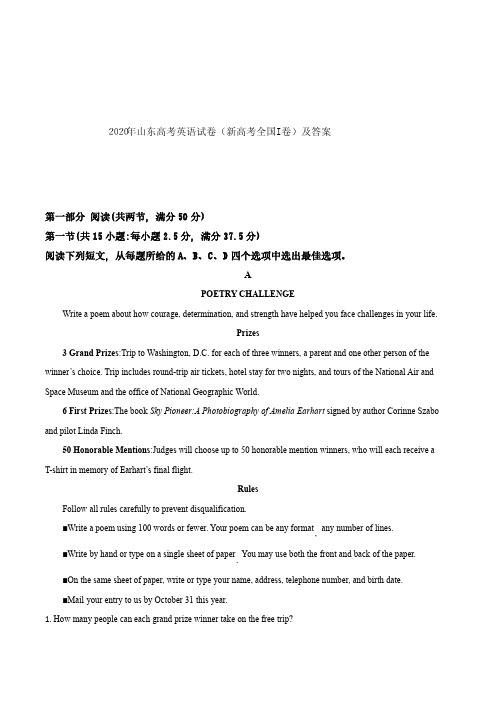
第一部分阅读(共两节,满分50分)第一节(共15小题:每小题2.5分,满分37.5分)阅读下列短文,从每题所给的A、B、C、D 四个选项中选出最佳选项。
APOETRY CHALLENGEWrite a poem about how courage,determination,and strength have helped you face challenges in your life.Prizes3Grand Prizes :Trip to Washington,D.C.for each of three winners,a parent and one other person of the winner’s choice.Trip includes round-trip air tickets,hotel stay for two nights,and tours of the National Air and Space Museum and the office of National Geographic World.6First Prizes :The book Sky Pioneer:A Photobiography of Amelia Earhart signed by author Corinne Szabo and pilot Linda Finch.50Honorable Mentions :Judges will choose up to 50honorable mention winners,who will each receive a T-shirt in memory of Earhart’s final flight.RulesFollow all rules carefully to prevent disqualification.■Write a poem using 100words or fewer.Your poem can be any format ,any number of lines.■Write by hand or type on a single sheet of paper .You may use both the front and back of the paper.■On the same sheet of paper,write or type your name,address,telephone number,and birth date.■Mail your entry to us by October 31this year.1.How many people can each grand prize winner take on the freetrip?A.Two.B.Three.C.Four.D.Six.2.What will each of the honorable mention winners get?A.A plane ticket.B.A book by Corinne Szabo.C.A special T-shirt.D.A photo of Amelia Earhart.3.Which of the following will result in disqualification?A.Typing your poem out.B.Writing a poem of120words.ing both sides of the paper.D.Mailing your entry on October30.BJenifer Mauer has needed more willpower than the typical college student to pursue her goal of earning a nursing degree.That willpower bore fruit when Jennifer graduated from University of Wisconsin-Eau Claire and became the first in her large family to earn a bachelor's degree.Mauer,of Edgar,Wisconsin,grew up on a farm in a family of10children.Her dad worked at a job away from the farm,and her mother ran the farm with the kids.After high school,Jennifer attended a local technical college, working to pay her tuition(学费),because there was no extra money set aside for a college education.After graduation,she worked to help her sisters and brothers pay for their schooling.Jennifer now is married and has three children of her own.She decided to go back to college to advance her career and to be able to better support her family while doing something she loves:nursing.She chose the UW-Eau Claire program at Ministry Saint Joseph's Hospital in Marshfield because she was able to pursue her four-year degree close to home.She could drive to class and be home in the evening to help with her kids.Jenifer received great support from her family as she worked to earn her degree:Her husband worked two jobs to cover the bills, and her68-year-old mother helped take care of the children at times.Through it all,she remained in good academic standing and graduated with honors.Jennifer sacrificed(牺牲)to achieve her goal,giving up many nights with her kids and missing important events to study.''Some nights my heart was breaking to have to pick between my kids and studying for exams or papers,''she says.However,her children have learned an important lesson witnessing their mother earn her degree.Jennifer is a first-generation graduate and an inspiration to her family-and that's pretty powerful.4.What did Jennifer do after high school?A.She helped her dad with his work.B.She ran the family farm on her own.C.She supported herself through college.D.She taught her sisters and brothers at home.5.Why did Jennifer choose the program at Ministry Saint Joseph's Hospital in Marshfield?A.To take care of her kids easily.B.To learn from the best nurses.C.To save money for her parents.D.To find a well-paid job there.6.What did Jennifer sacrifice to achieve her goal?A.Her health.B.Her time with family.C.Her reputation.D.Her chance of promotion.7.What can we learn from Jenifer's story?A.Time is money.B.Love breaks down barriers.C.Hard work pays off.cation is the key to success.CIn the mid-1990s,Tom Bissell taught English as a volunteer in Uzbekistan.He left after seven months, physically broken and having lost his mind.A few years later,still attracted to the country,he returned to Uzbekistan to write an article about the disappearance of the Aral Sea.His visit,however,ended up involving a lot more than that.Hence this book,Chasing the Sea:Lost Among the Ghosts of Empire in Central Asia,which talks about a road trip from Tashkent to Karakalpakstan,where millions of lives have been destroyed by the slow drying up of the sea.It is the story of an American travelling to a strange land,and of the people he meets on his way:Rustam,his translator,a lovely24-year-old who picked up his colorful English in California,Oleg and Natasha,his hosts in Tashkent,and a string of foreign aid workers.This is a quick look at life in Uzbekistan,made of friendliness and warmth,but also its darker side of society. In Samarkand,Mr Bissell admires the architectural wonders,while on his way to Bukhara he gets a taste of police methods when suspected of drug dealing.In Ferghana,he attends a mountain funeral(葬礼)followed by a strange drinking party.And in Karakalpakstan,he is saddened by the dust storms,diseases and fishing boats stuck miles from the sea.Mr Bissell skillfully organizes historical insights and cultural references,making his tale a well-rounded picture of Uzbekistan,seen from Western eyes.His judgment and references are decidedly American,as well as his delicate stomach.As the author explains,this is neither a travel nor a history book,or even a piece of reportage. Whatever it is,the result is a fine and vivid description of the purest of Central Asian traditions.8.What made Mr Bissell return to Uzbekistan?A.His friends'invitation.B.His interest in the country.C.His love for teaching.D.His desire to regain health.9.What does the underlined word“that”in paragraph2refer to?A.Developing a serious mental disease.B.Taking a guided tour in Central Asia.C.Working as a volunteer in Uzbekistan.D.Writing an article about the Aral Sea.10.Which of the following best describes Mr Bissell's road trip in Uzbekistan?A.Romantic.B.Eventful.C.Pleasant.D.Dangerous.11.What is the purpose of this text?A.To introduce a book.B.To explain a cultural phenomenon.C.To remember a writer.D.To recommend a travel destination.DAccording to a recent study in the Journal of Consumer Research,both the size and consumption habits of our eating companions can influence our food intake.And contrary to existing research that says you should avoid eating with heavier people who order large portions(份),it's the beanpoles with big appetites you really need to avoid.To test the effect of social influence on eating habits,the researchers conducted two experiments.In the first, 95undergraduate women were individually invited into a lab to ostensibly(表面上)participate in a study about movie viewership.Before the film began,each woman was asked to help herself to a snack.An actor hired by the researchers grabbed her food first.In her natural state,the actor weighed105pounds.But in half the cases she wore a specially designed fat suit which increased her weight to180pounds.Both the fat and thin versions of the actor took a large amount of food.The participants followed suit,taking more food than they normally would have.However,they took significantly more when the actor was thin.For the second test,in one case the thin actor took two pieces of candy from the snack bowls.In the other case, she took30pieces.The results were similar to the first test:the participants followed suit but took significantly more candy when the thin actor took30pieces.The tests show that the social environment is extremely influential when we're making decisions.If this fellow participant is going to eat more,so will I.Call it the“I’ll have what she's having”effect.However,we'll adjust the influence.If an overweight person is having a large portion,I'll hold back a bit because I see the results of his eating habits.But if a thin person eats a lot,I'll follow suit.If he can eat much and keep slim,why can't I?12.What is the recent study mainly about?A.Food safety.B.Movie viewership.C.Consumer demand.D.Eating behavior.13.What does the underlined word“beanpoles”in paragraph1refer to?A.Big eaters.B.Overweight persons.C.Picky eaters.D.Tall thin persons.14.Why did the researchers hire the actor?A.To see how she would affect the participants.B.To test if the participants could recognize her.C.To find out what she would do in the two tests.D.To study why she could keep her weight down.15.On what basis do we“adjust the influence”according to the last paragraph?A.How hungry we are.B.How slim we want to be.C.How we perceive others.D.How we feel about the food.第二节(共5小题:每小题2.5分,满分12.5分)阅读下面短文,从短文后的选项中选出可以填入空白处的最佳选项。
高中英语 2020年山东首次新高考读后续写(新高考1卷)
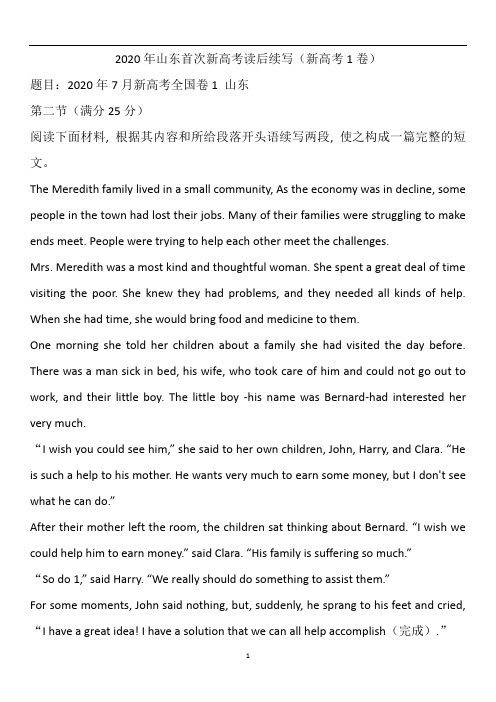
2020年山东首次新高考读后续写(新高考1卷)题目:2020年7月新高考全国卷1 山东第二节(满分25分)阅读下面材料, 根据其内容和所给段落开头语续写两段, 使之构成一篇完整的短文。
The Meredith family lived in a small community, As the economy was in decline, some people in the town had lost their jobs. Many of their families were struggling to make ends meet. People were trying to help each other meet the challenges.Mrs. Meredith was a most kind and thoughtful woman. She spent a great deal of time visiting the poor. She knew they had problems, and they needed all kinds of help. When she had time, she would bring food and medicine to them.One morning she told her children about a family she had visited the day before. There was a man sick in bed, his wife, who took care of him and could not go out to work, and their little boy. The little boy -his name was Bernard-had interested her very much.“I wish you could see him,” she said to her own children, John, Harry, and Clara. “He is such a help to his mother. He wants very much to earn some money, but I don't see what he can do.”After their mother left the room, the children sat thinking about Bernard. “I wish we could help him to earn money.” said Clara. “His family is suffering so much.”“So do 1,” said Harry. “We really should do something to assist them.”For some moments, John said nothing, but, suddenly, he sprang to his feet and cried, “I have a great idea! I have a solution that we can all help accomplish(完成).”The other children also jumped up all attention. When John had an idea, it was sure to be a good one. “I tell you what we can do,”said John. “You know that big box of com Uncle John sent us?Well, we can make popcorn(爆米花), and put it into paper bags, and Bernard can take it around to the houses and sell it.”注意:1. 续写词数应为150左右:2. 请按如下格式在答题卡的相应位置作答。
2020年山东新高考英语听力试题(含原文+答案)
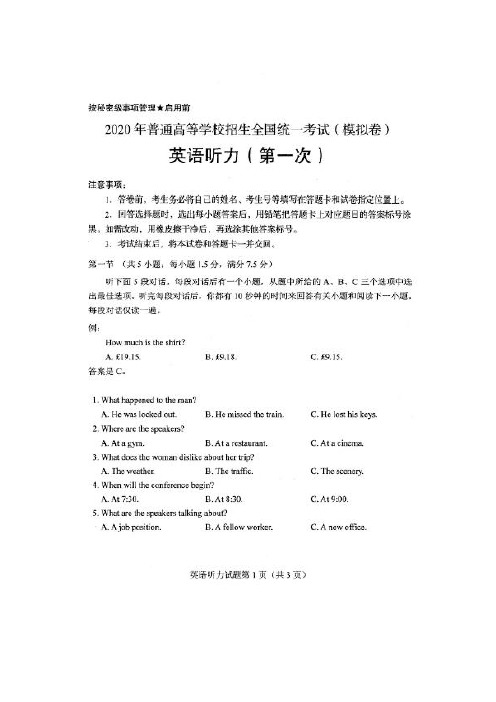
◆◆听力原文一◆◆Text 1M: Know what?I couldn’t get back into my apartment and had to stay at a hotel last night.W: How did that happen? Did you lose your keys?M: No, I left them in the apartment and my wife was on a business trip.Text 2M: Wow, so many choices and so many people. So, what kind of film do you want to see?W: It’s up to you, but nothing too violent, please.Text 3M: How was your trip to London?W: It was fantastic.I visited a lot of places, churches, museums and the royal palaces, and the weather was fine.Horrible traffic, though.Text 4W: How much time do we have before the conference? We don’t have to hurry, do we?M: Don’t worry.It’s seven thirty now. We still have an hour and a half. It takes only thirty minutes to get there.Text 5M: Hey, did you see Ann in the office this morning?W: Yes, but why did she have such a long face?M: I’m not sure.I heard she failed to get promoted.Text 6M: What about the problems I’ve been having?W: Not serious. Take some medici ne and you will get a better night’s sleep. M: Thank you. How should I take the medicine?W: Take one pill about thirty minutes before you go to bed.M: How long should I take them?W: Thirty days.M: Is there anything else I can do?W: Don’t worry so much about things at work.M: Should I stay home from work?W: No, it’s not necessary. Just remember to stay calm.Text 7W: You’re late!M: Yes, I’m really sorry. I had to wait for ages for the bus.W: Why didn’t you drive?M: Ah, well, I’ve sold my car.W: Oh, are you getting a new one?M: No,I’m not getting another car.I’ve decided to live without one.W: Wow, what made you do that?M: I think there are too many cars and this town is already far too polluted. W: Well, that’s true, but a car is useful.M: I don’t think so, not in the city center anyway.I can never find anywhere to park and you spend most of the time sitting in traffic jams.W: But how are you going to get to work?M: I’m thinking of getting a bicycle.W: Don’t you think bicycles are dangerous?M: Not really.I don’t think they’re as dangerous as cars.W: Well,I couldn’t do without my car. I have to take the children to school every day.M: I don’t think children get enough exercise these days.They should walk to school.W: Okay, I see what you mean.Text 8M: Hey,Heather.Can I sit here?W: Yeah, sure, Jonathan.How’s your day?M: Good.Say, are you planning your summer travels?W: Well, not yet.I was just reading a story about this woman Alan Wilson, who climbed up Mount Qomolangma.M: Yeah,I read that too. A rather extraordinary experience, isn’t it? Ninety six days!She is actually a graduate of our college, class of 2012.W: Oh, really?So Jonathan, what amazing thing have you done?M: Well,I just went cycling across South America.W: You didn’t.M: I did, just last year before I entered the graduate school. It was such a brilliant time, four months on the road and enjoying wonderful scenery in the country, in towns and in cities all along the way. I got a bit tired, though.W: Sounds great, hmm, maybe I should think seriously about my big life adventure, like taking a long walk across a national park.M: Wow, let me know if you need someone to go with you.Text 9W: Hi,Matt. May I ask you a few questions?M: Certainly Julian, what do you want to know?W: I’m doing a study on the spending habits of students in our school. I’m writing a paper for my social studies course.M: That sounds interesting!W: To begin with, how much money do you get from your parents a month? M: I get about five hundred dollars.W: How do you spend your money?M: I spend about three hundred dollars on food, you know how I like to eat. W: Yes, what about the rest of the money?M: Well,I spend on shows, about thirty dollars a month. Games, uh, for rental of tennis, court and balls, about fifty dollars. I do spend some one on things like reading material and the rest I save.W: What about clothes?M: My mother buys them for me.W: Thanks a lot,Matt!M: You’re welcome!Text 10W: Hello, everyone. I’m very glad to be here to talk to you. People need to feel secure and comfortable, so they can be creative.Well designed workplaces often create environments that make employees better thinkers. So today, I’ll talk about how to design workplaces that inspire creativity.I hope you can find it useful. First, the color of the office walls.Decorate your office with green.Other bright colors such as light blue and yellow can also increase creativity. Calmer colors help us concentrate. Green also reminds us of nature, which may help us to relax.Avoid red when you are choosing a color.While it can give us a feeling of energy, it also affects our ability to analyze information. Then let’s turn to lighting. Lighting is also important.Too dark and workers can feel sleepy, well, if it is too bright, it can make them feel anxious. The best kind of lighting is natural light.It makes us happier and more productive.When it comes to artificial lighting, warm colors are the best. But if we need to concentrate, a bluer light is better. Space is another important matter. A company might want to develop a variety of spaces in an office, so staff can find privacy if needed, but also work in open areas for creative thinking.◆◆听力原文二◆◆Text 1W: Steve, I think we have gone off, of course. We’ve been cycl ing for an hour and there’s no beach in sight.M: I don’t think so. I’ve been checking the map. Across this part to the international hotel and the beach’s one mile from there.Text 2M: Nancy, are you having a big Christmas dinner at your house this year? W: Actually, I plan to spend Christmas at a homeless shelter with some friends. We just want to do something for the people there.Text 3W: Oh, no, I think we’ve just missed the bus.M: How can that be? It says here that the bus’s arriving at ten fi fty five. My watch says we’re five minutes ahead of time. Wait a minute! The town hall clock is striking eleven!Text 4M: There used to be a bookstore on the corner of Lear Road and Nelson Street. Is it still there?W: Not any more. It’s a restaurant now. The bookstore has moved to Huntington Road, just next to the shopping centre.Text 5W: Would you pick up some milk and eggs from the supermarket?M: Sure, do you need anything else?W: No, oh, wait! Get some bread too. We don’t have any for breakf ast tomorrow.Text 6W: What can I do for you?M: I’d like to return these books.W: Okay, um. What happened to this book?M: I dropped it and the cover tore off. Sorry!W: Well, I’m afraid you’ll have to pay a fine for the damage.M: How much?W: Three dollars.M: That’s not too bad.W: You can pay it now or at the end of the month.M: I’ll pay it now.Here you are.Text 7W: Can I help you?M: Yes, I’m looking for a gift for my daughter’s birthday, and I want something special.W: Right, daughters are Daddy’s little girls. We have all kinds of sweet things that are specially designed for young girls. What about this set of heart shaped tea cups and saucers? Every time she pours a drink into the cup, a heart appears. The set includes six different colored tea cups and saucers. The price is fifty six dollars ninety cents.M: It looks quite good. What’s that bag over there?W: It’s an apple-tree-to-be gift set. It has everything needed to grow an apple tree—tree seed, pot, growing medium and directions.M: Oh, this is a great idea. Many years later, it will grow into a big apple tree in the garden, and it will always remind her of this special birthday.W: Yeah, yeah, isn’t it great?M: How much is it?W: Twenty four dollars ninety five cents.M: I’ll take the apple tree set.Text 8W: Karl, don’t you think you should take a break? You haven’t gone on a holiday for the last two years.M: I would like to, Susan, but it is not possible. There is too much work.W: But you look too tired. You need a break.M: I know, but as long as they don’t hire more people, my chances are slim.W: Why don’t they hire more people?M: Because they want to keep costs down.W: Have you discussed this with the manager?M: Well, I did have a word with him last month, but I don’t think thathelped much.W: In that case, you should consider changing jobs.M: I have been thinking about it for a while. You would let me know if you find any positions available, wouldn’t you?W: Of course, but you should also look for wanted ads.M: I’ve already done that, but I haven’t yet found a job opening that suits my skills.W: Don’t lose hope.You will find a good job soon.Text 9M: Amy, how are you doing?W: Oh, hi Stewart.School is so crazy these days and when I’m not at school, I’m at work.M: Hey,listen! I’m getting together with Sara and Paul tonight, and a few of our other friends are going to join us, and we’re...Well, we’re going out to eat and then catch a movie. Why don’t you come with us?W: Hey, I’d love to, but I have to pr epare for a test next week.M: Ah, come on, we’re planning on having dinner around six thirty and then seeing a movie at seven e on!W: I hate,I don’t think, I’d better...I haven’t been feeling well lately.M: Yeah, because you study too much.C ome on!Relax!And at Sara’s birthday too.And we’re throwing her a small birthday party after the movie. It will be over at around ten thirty and you’ll be home half an hour e on!W: Oh, okay. Where do we meet for the dinner?M: At the Chinese resta urant on Jackson street. I’ll pick you up at six o’clock. Text 10W: This is radio Oxton. It’s ten o’clock, and here is the local news. The hot dry weather is still causing problems. It hasn’t rained for six weeks and water is in short supply. The police have asked the local people not to water their gardens more than once a week during the emergency period. The washing of cars is completely banned. The temperature at two pm yesterday was a record 32 degrees. Hospitals have reported a large number of cases caused by the extreme heat.Old people and babies are most at risk. Unfortunately, the weather forecast says the hot dry weather will continue for three or four more days. Who says it always rains in England?There has been a small fire at Oxton General Hospital. More than twenty patients were moved away from part of the building as firemen went for the fire.The fire was not serious. The firemen stopped it in a couple of minutes and everything now is back to normal. Well, that’s the news at ten o’clock. Th e next news will be in two hours at midday.◆◆参考答案◆◆第一次1-5 ACBCB 6-10 ACBCC 11-15 ABABA 16-20 ABBCA ◆◆参考答案◆◆第二次1-5 BBCCA6-10 BACCA11-15 ACABA 16-20 BABCC。
2020年高考山东卷(新高考全国I卷)英语真题听力第一次考试(含听力音频、听力原文和答案)

2020年普通高等学校招生全国统一考试山东卷(新高考全国I卷)英语听力第一次考试2020年高考山东卷(新高考全国I卷) 英语听力第一次考试音频 双击图标打开收听.mp4(请用电脑,双击上面图标,打开收听)使用地区:山东第一部分听力(共两节,满分30分)做题时,先将答案标在试卷上。
录音内容结束后,你将有两分钟的时间将试卷上的答案转涂到答题卡上。
第一节(共5小题;每小题1.5分,满分7.5分)听下面5段对话。
每段对话后有一个小题,从题中所给的A、B、C三个选项中选出最佳选项。
听完每段对话后,你都有10秒钟的时间来回答有关小题和阅读下一小题。
每段对话仅读一遍。
例:How much is the shirt?A. £19.15.B. £9.18.C. £9.15.答案是C。
1. Where does the conversation take place?A. At a storeB. At a gymC. At home2. How will David get to the club?A. By carB. By trainC. By bike3. What is Jane studying?A. BiologyB. ChemistryC. Calligraphy4. What is the man doing?A. Buying an air conditionerB. Returning an air conditioner.C. Fixing an air conditioner5. How does the woman probably feel?A. ExcitedB. AnnoyedC. Puzzled第二节(共15小题;每小题1.5分,满分22.5分)听下面5段对话或独白。
每段对话或独白后有几个小题,从题中所给的A、B、C三个选项中选出最佳选项。
听每段对话或独白前,你将有时间阅读各个小题,每小题5秒钟;听完后,各小题将给出5秒钟的作答时间。
2020年全国普通高等学校招生统一考试英语试卷 全国新高考Ⅰ卷 (含答案)

2020年全国普通高等学校招生统一考试试卷全国新高考Ⅰ卷英语注意事项:1. 答卷前, 考生务必将自己的姓名、准考证号填写在答题卡上。
2. 回答选择题时, 选出每小题答案后, 用铅笔把答题卡上对应题目的答案标号涂黑。
如需改动, 用橡皮擦干净后, 再选涂其他答案标号。
回答非选择题时, 将答案写在答题卡上, 写在本试卷上无效。
3. 考试结束后, 将本试卷和答题卡一并交回。
第一部分阅读(共两节, 满分50分)第一节(共15小题:每小题2.5分, 满分37.5分)阅读下列短文, 从每题所给的A、B、C、D四个选项中选出最佳选项。
APOETRY CHALLENGEWrite a poem about how courage, determination, and strength have helped you face challenges in your life.Prizes3 Grand Prizes:Trip to Washington, D.C. for each of three winners, a parent and one other person of the winner's choice. Trip includes round-trip air tickets, hotel stay for two nights, and tours of the National Air and Space Museum and the office of National Geographic World.6 First Prizes:The book Sky Pioneer:A Photobiography of Amelia Earhart signed by author Corinne Szabo and pilot Linda Finch.50 Honorable Mentions:Judges will choose up to 50 honorable mention winners, who will each receive a T-shirt in memory of Earhart's final flight.RulesFollow all rules carefully to prevent disqualification.■Write a poem using 100 words or fewer. Your poem can be any format, any number of lines.■Write by hand or type on a single sheet of paper. You may use both the front and back of the paper.■On the same sheet of paper, write or type your name, address, telephone number, and birth date.■Mail your entry to us by October 31 this year.1. How many people can each grand prize winner take on the free trip? ()A. Two.B. Three.C. Four.D. Six.2. What will each of the honorable mention winners get? ()A. A plane ticket.B. A book by Corinne Szabo.C. A special T-shirt.D. A photo of Amelia Earhart.3. Which of the following will result in disqualification? ()A. Typing your poem out.B. Writing a poem of 120 words.C. Using both sides of the paper.D. Mailing your entry on October 30.BJenifer Mauer has needed more willpower than the typical college student to pursue her goal of earning a nursing degree. That willpower bore fruit when Jennifer graduated from University of Wisconsin-Eau Claire and became the first in her large family to earn a bachelor's degree.Mauer, of Edgar, Wisconsin, grew up on a farm in a family of 10 children. Her dad worked at a job away from the farm, and her mother ran the farm with the kids. After high school, Jennifer attended a local technical college, working to pay her tuition(学费), because there was no extra money set aside for a college education. After graduation, she worked to help her sisters and brothers pay for their schooling.Jennifer now is married and has three children of her own. She decided to go back to college to advance her career and to be able to better support her family while doing something she loves: nursing. She chose the UW-Eau Claire program at Ministry Saint Joseph's Hospital in Marshfield because she was able to pursue her four-year degree close to home. She could drive to class and be home in the evening to help with her kids. Jenifer received great support from her family as she worked to car her degree: Her husband worked two jobs to cover the bills, and her 68-year-old mother helped take care of the children at times.Through it all, she remained in good academic standing and graduated with honors. Jennifer sacrificed(牺牲)to achieve her goal, giving up many nights with her kids and missing important events to study. “Some nights my heart was breaking to have to pick betw een my kids and studying for exams or papers,” she says. However, her children have learned an important lesson witnessing their mother earn her degree. Jennifer is a first-generation graduate and an inspirationto her family-and that's pretty powerful.4. What did Jennifer do after high school? ()A. She helped her dad with his work.B. She ran the family farm on her own.C. She supported herself through college.D. She taught her sisters and brothers at home.5. Why did Jennifer choose the program at Ministry Saint Joseph's Hospital in Marshfield? ()A. To take care of her kids easily.B. To learn from the best nurses.C. To save money for her parents.D. To find a well-paid job there.6. What did Jennifer sacrifice to achieve her goal? ()A. Her health.B. Her time with family.C. Her reputation.D. Her chance of promotion.7. What can we learn from Jenifer's story? ()A. Time is money.B. Love breaks down barriers.C. Hard work pays off.D. Education is the key to success.CIn the mid-1990s, Tom Bissell taught English as a volunteer in Uzbekistan. He left after seven months, physically broken and having lost his mind. A few years later, still attracted to the country, he returned to Uzbekistan to write an article about the disappearance of the Aral Sea.His visit, however, ended up involving a lot more than that. Hence this book, Chasing the Sea: Lost Among the Ghosts of Empire in Central Asia, which talks about a road trip from Tashkent to Karakalpakstan, where millions of lives have been destroyed by the slow drying up of the sea. It is the story of an American travelling to a strange land, and of the people he meets on his way: Rustam, his translator, a lovely 24-year-old who picked up his colorful English in California, Oleg and Natasha, his hosts in Tashkent, and a string of foreign aid workers.This is a quick look at life in Uzbekistan, made of friendliness and warmth, but also its darker side of society. In Samarkand, Mr Bissell admires the architectural wonders, while on his way to Bukhara he gets a taste of police methods when suspected of drug dealing. In Ferghana, he attends a mountain funeral(葬礼)followed by a strange drinking party. And in Karakalpakstan, he issaddened by the dust storms, diseases and fishing boats stuck miles from the sea.Mr Bissell skillfully organizes historical insights and cultural references, making his tale a well-rounded picture of Uzbekistan, seen from Western eyes. His judgment and references are decidedly American, as well as his delicate stomach. As the author explains, this is neither a travel nor a history book, or even a piece of reportage. Whatever it is, the result is a fine and vivid description of the purest of Central Asian traditions.8. What made Mr Bissell return to Uzbekistan? ()A. His friends' invitation.B. His interest in the country.C. His love for teaching.D. His desire to regain health.9. What does the underlined word “that” in paragraph 2 refer to? ()A. Developing a serious mental disease.B. Taking a guided tour in Central Asia.C. Working as a volunteer in Uzbekistan.D. Writing an article about the Aral Sea.10. Which of the following best describes Mr Bissell's road trip in Uzbekistan? ()A. Romantic.B. Eventful.C. Pleasant.D. Dangerous.11. What is the purpose of this text? ()A. To introduce a book.B. To explain a cultural phenomenon.C. To remember a writer.D. To recommend a travel destination.DAccording to a recent study in the Journal of Consumer Research, both the size and consumption habits of our eating companions can influence our food intake. And contrary to existing research that says you should avoid eating with heavier people who order large portions (份), it's the beanpoles with big appetites you really need to avoid.To test the effect of social influence on eating habits, the researchers conducted two experiments. In the first, 95 undergraduate women were individually invited into a lab to ostensibly(表面上)participate in a study about movie viewership. Before the film began, each woman was asked to help herself to a snack. An actor hired by the researchers grabbed her food first. In her natural state, the actor weighed 105 pounds. But in half the cases she wore a specially designed fat suit which increased her weight to 180 pounds.Both the fat and thin versions of the actor took a large amount of food. The participants followed suit, taking more food than they normally would have. However, they took significantly more when the actor was thin.For the second test, in one case the thin actor took two pieces of candy from the snack bowls. In the other case, she took 30 pieces. The results were similar to the first test: the participants followed suit but took significantly more candy when the thin actor took 30 pieces.The tests show that the social environment is extremely influential when we're making decisions. If this fellow participant is going to eat more, so will I. Call it the “I’ll have what she's having” effe ct. However, we'll adjust the influence. If an overweight person is having a large portion, I'll hold back a bit because I see the results of his eating habits. But if a thin person eats a lot, I'll follow suit. If he can eat much and keep slim, why can't I?12. What is the recent study mainly about? ()A. Food safety.B. Movie viewership.C. Consumer demand.D. Eating behavior.13. What does the underlined word "beanpoles" in paragraph 1 refer to? ()A. Big eaters.B. Overweight persons.C. Picky eaters.D. Tall thin persons.14. Why did the researchers hire the actor? ()A. To see how she would affect the participants.B. To test if the participants could recognize her.C. To find out what she would do in the two tests.D. To study why she could keep her weight down.15. On what basis do we "adjust the influence" according to the last paragraph? ()A. How hungry we are.B. How slim we want to be.C. How we perceive others.D. How we feel about the food.第二节(共5小题:每小题2. 5分, 满分12. 5分)阅读下面短文, 从短文后的选项中选出可以填入空白处的最佳选项。
2020年高考英语山东卷语法填空试题及答案详解
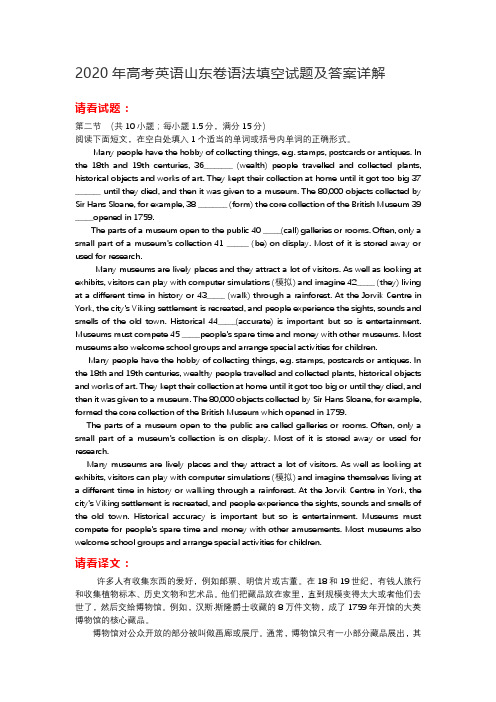
2020年高考英语山东卷语法填空试题及答案详解请看试题:第二节(共10小题;每小题1.5分,满分15分)阅读下面短文,在空白处填入1个适当的单词或括号内单词的正确形式。
Many people have the hobby of collecting things, e.g. stamps, postcards or antiques. In the 18th and 19th centuries, 36________ (wealth) people travelled and collected plants, historical objects and works of art. They kept their collection at home until it got too big 37 _______ until they died, and then it was given to a museum. The 80,000 objects collected by Sir Hans Sloane, for example, 38 ________ (form) the core collection of the British Museum 39 _____opened in 1759.The parts of a museum open to the public 40 _____(call) galleries or rooms. Often, only a small part of a museum's collection 41 ______ (be) on display. Most of it is stored away or used for research.Many museums are lively places and they attract a lot of visitors. As well as looking at exhibits, visitors can play with computer simulations (模拟) and imagine 42_____ (they) living at a different time in history or 43_____ (walk) through a rainforest. At the Jorvik Centre in York, the city’s Viking settlement is recreated, and people experience the sights, sounds and smells of the old town. Historical 44_____(accurate) is important but so is entertainment. Museums must compete 45 _____people's spare time and money with other museums. Most museums also welcome school groups and arrange special activities for children.Many people have the hobby of collecting things, e.g. stamps, postcards or antiques. In the 18th and 19th centuries, wealthy people travelled and collected plants, historical objects and works of art. They kept their collection at home until it got too big or until they died, and then it was given to a museum. The 80,000 objects collected by Sir Hans Sloane, for example, formed the core collection of the British Museum which opened in 1759.The parts of a museum open to the public are called galleries or rooms. Often, only a small part of a museum's collection is on display. Most of it is stored away or used for research.Many museums are lively places and they attract a lot of visitors. As well as looking at exhibits, visitors can play with computer simulations (模拟) and imagine themselves living at a different time in history or walking through a rainforest. At the Jorvik Centre in York, the city's Viking settlement is recreated, and people experience the sights, sounds and smells of the old town. Historical accuracy is important but so is entertainment. Museums must compete for people's spare time and money with other amusements. Most museums also welcome school groups and arrange special activities for children.请看译文:许多人有收集东西的爱好,例如邮票、明信片或古董。
2023年山东高考英语试卷
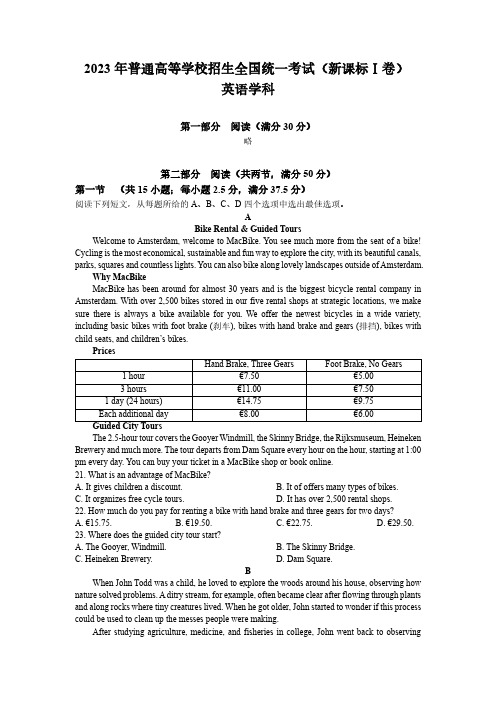
2023年普通高等学校招生全国统一考试(新课标Ⅰ卷)英语学科第一部分阅读(满分30分)略第二部分阅读(共两节,满分50分)第一节(共15小题;每小题2.5分,满分37.5分)阅读下列短文,从每题所给的A、B、C、D四个选项中选出最佳选项。
ABike Rental & Guided ToursWelcome to Amsterdam, welcome to MacBike. You see much more from the seat of a bike! Cycling is the most economical, sustainable and fun way to explore the city, with its beautiful canals, parks, squares and countless lights. You can also bike along lovely landscapes outside of Amsterdam.Why MacBikeMacBike has been around for almost 30 years and is the biggest bicycle rental company in Amsterdam. With over 2,500 bikes stored in our five rental shops at strategic locations, we make sure there is always a bike available for you. We offer the newest bicycles in a wide variety, including basic bikes with foot brake (刹车), bikes with hand brake and gears (排挡), bikes with child seats, and children’s bikes.Hand Brake, Three Gears Foot Brake, No Gears1 hour€7.50€5.003 hours€11.00€7.501 day (24 hours)€14.75€9.75Each additional day€8.00€6.00The 2.5-hour tour covers the Gooyer Windmill, the Skinny Bridge, the Rijksmuseum, Heineken Brewery and much more. The tour departs from Dam Square every hour on the hour, starting at 1:00 pm every day. You can buy your ticket in a MacBike shop or book online.21. What is an advantage of MacBike?A. It gives children a discount.B. It of offers many types of bikes.C. It organizes free cycle tours.D. It has over 2,500 rental shops.22. How much do you pay for renting a bike with hand brake and three gears for two days?A. €15.75.B. €19.50.C. €22.75.D. €29.50.23. Where does the guided city tour start?A. The Gooyer, Windmill.B. The Skinny Bridge.C. Heineken Brewery.D. Dam Square.BWhen John Todd was a child, he loved to explore the woods around his house, observing how nature solved problems. A ditry stream, for example, often became clear after flowing through plants and along rocks where tiny creatures lived. When he got older, John started to wonder if this process could be used to clean up the messes people were making.After studying agriculture, medicine, and fisheries in college, John went back to observingnature and asking questions. Why can certain plants trap harmful bacteria (细菌)? Which kinds of fish can eat cancer-causing chemicals? With the right combination of animals and plants, he figured, maybe he could clean up waste the way nature did. He decided to build what he would later call an eco-machine.The task John set for himself was to remove harmful substances from some sludge (污泥). First, he constructed a series of clear fiberglass tanks connected to each other. Then he went around to local ponds and streams and brought back some plants and animals. He placed them in the tanks and waited. Little by little, these different kinds of life got used to one another and formed their own ecosystem. After a few weeks, John added the sludge.He was amazed at the results. The plants and animals in the eco-machine took the sludge as food and began to eat it! Within weeks, it had all been digested, and all that was left was pure water.Over the years, John has taken on many big jobs. He developed a greenhouse-like facility that treated sewage (污水) from 1,600 homes in South Burlington. He also designed an eco-machine to clean canal water in Fuzhou, a city in southeast China.“Ecological design” is the name John gives to what he does. “Life on Earth is kind of a box of spare parts for the inventor,” he says. “You put organisms in new relationships and observe what’s happening. Then you let these new systems develop their own ways to self-repair.”24. What can we learn about John from the first two paragraphs?A. He was fond of traveling.B. He enjoyed being alone.C. He had an inquiring mind.D. He longed to be a doctor.25. Why did John put the sludge into the tanks?A. To feed the animals.B. To build an ecosystem.C. To protect the plants.D. To test the eco-machine.26. What is the author’s purpose in mentioning Fuzhou?A. To review John’s research plans.B. To show an application of John’s idea.C. To compare John’s different jobs.D. To erase doubts about John’s invention.27. What is the basis for John’s work?A. Nature can repair itself.B. Organisms need water to survive.C. Life on Earth is diverse.D. Most tiny creatures live in groups.CThe goal of this book is to make the case for digital minimalism, including a detailed exploration of what it asks and why it works, and then to teach you how to adopt this philosophy if you decide it’s right for you.To do so, I divided the book into two parts. In part one, I describe the philosophical foundations of digital minimalism, starting with an examination of the forces that are making so many people’s digital lives increasingly intolerable, before moving on to a detailed discussion of the digital minimalism philosophy.Part one concludes by introducing my suggested method for adopting this philosophy: the digital declutter. This process requires you to step away from optional online activities for thirty days. At the end of the thirty days, you will then add back a small number of carefully chosen online activities that you believe will provide massive benefits to the things you value.In the final chapter of part one, I’ll guide you through carrying out your own digital declutter. In doing so, I’ll draw on an experiment I ran in 2018 in which over 1,600 people agreed to perform a digital declutter. You’ll hear these participants’ stories and learn what strategies worked well for them, and what traps they encountered that you should avoid.The second part of this book takes a closer look at some ideas that will help you cultivate (培养) a sustainable digital minimalism lifestyle. In these chapters, I examine issues such as theimportance of solitude (独处) and the necessity of cultivating high-quality leisure to replace the time most now spend on mindless device use. Each chapter concludes with a collection of practices, which are designed to help you act on the big ideas of the chapter. You can view these practices as a toolbox meant to aid your efforts to build a minimalist lifestyle that words for your particular circumstances.28. What is the book aimed at?A. Teaching critical thinking skills.B. Advocating a simple digital lifestyle.C. Solving philosophical problems.D. Promoting the use of a digital device.29. What does the underlined word “declutter” in paragraph 3 mean?A. Clear-up.B. Add-on.C. Check-in.D. Take-over.30. What is presented in the final chapter of part one?A. Theoretical models.B. Statistical methods.C. Practical examples.D. Historical analyses.31. What does the author suggest readers do with the practices offered in part two?A. Use them as needed.B. Recommend them to friends.C. Evaluate their effects.D. Identify the ideas behind them.DOn March 7, 1907, the English statistician Francis Galton published a paper which illustrated what has come to be known as the “wisdom of crowds” effect. The experiment of estimation he conducted showed that in some cases, the average of a large number of independent estimates could be quite accurate.This effect capitalizes on the fact that when people make errors, those errors aren’t always the same. Some people will tend to overestimate, and some to underestimate. When enough of these errors are averaged together, they cancel each other out, resulting in a more accurate estimate. If people are similar and tend to make the same errors, then their errors won’t cancel each other out. In more technical terms, the wisdom of crowds requires that people’s estimates be independent. If for whaterer reasons, people’s errors become correlated or dependent, the accuracy of the estimate will go down.But a new study led by Joaquin Navajas offered an interesting twist (转折) on this classic phenomenon. The key finding of the study was that when crowds were further divided into smaller groups that were allowed to have a discussion, the averages from these groups were more accurate than those from an equal number of independent individuals. For instance, the average obtained from the estimates of four discussion groups of five was significantly more accurate than the average obtained from 20 independent individuals.In a follow-up study with 100 university students, the researchers tried to get a better sense of what the group members actually did in their discussion. Did they tend to go with those most confident about their estimates? Did they follow those least willing to change their minds? This happened some of the time, but it wasn’t the dominant response. Most frequently, the groups reported that they “shared arguments and reasoned together.” Somehow, these arguments and reasoning resulted in a global reduction in error. Although the studies led by Navajas have limitations and many questions remain the potential implications for group discussion and decision-making are enormous.32. What is paragraph 2 of the text mainly about?A. The methods of estimation.B. The underlying logic of the effect.C. The causes of people’s errors.D. The design of Galton’s experiment.33. Navajas’ study found that the average accuracy could increase even if ________.A. the crowds were relatively smallB. there were occasional underestimatesC. individuals did not communicateD. estimates were not fully independent34. What did the follow-up study focus on?A. The size of the groups.B. The dominant members.C. The discussion process.D. The individual estimates.35. What is the author’s attitude toward Navajas’ studies?A. Unclear.B. Dismissive.C. Doubtful.D. Approving.第二节(共5小题;每小题2.5分,满分12.5分)阅读下面短文,从短文后的选项中选出可以填入空白处的最佳选项。
2020年新高考卷Ⅰ英语(山东)高考真题
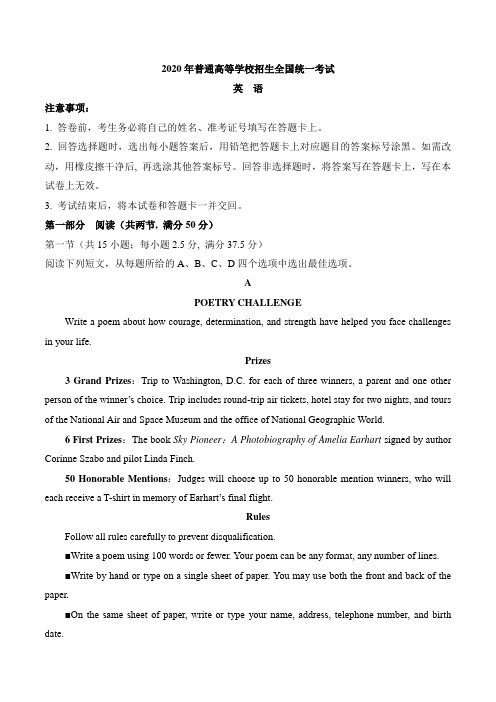
2020年普通高等学校招生全国统一考试英语注意事项:1. 答卷前,考生务必将自己的姓名、准考证号填写在答题卡上。
2. 回答选择题时,选出每小题答案后,用铅笔把答题卡上对应题目的答案标号涂黑。
如需改动,用橡皮擦干净后, 再选涂其他答案标号。
回答非选择题时,将答案写在答题卡上,写在本试卷上无效。
3. 考试结束后,将本试卷和答题卡一并交回。
第一部分阅读(共两节, 满分50分)第一节(共15小题;每小题2.5分, 满分37.5分)阅读下列短文,从每题所给的A、B、C、D四个选项中选出最佳选项。
APOETRY CHALLENGEWrite a poem about how courage, determination, and strength have helped you face challenges in your life.Prizes3 Grand Prizes:Trip to Washington, D.C. for each of three winners, a parent and one other person of the winner’s choice. Trip includes round-trip air tickets, hotel stay for two nights, and tours of the National Air and Space Museum and the office of National Geographic World.6 First Prizes:The book Sky Pioneer:A Photobiography of Amelia Earhart signed by author Corinne Szabo and pilot Linda Finch.50 Honorable Mentions:Judges will choose up to 50 honorable mention winners, who will each receive a T-shirt in memory of Earhart’s final flight.RulesFollow all rules carefully to prevent disqualification.■Write a poem usin g 100 words or fewer. Your poem can be any format, any number of lines.■Write by hand or type on a single sheet of paper. You may use both the front and back of the paper.■On the same sheet of paper, write or type your name, address, telephone number, and birth date.■Mail your entry to us by October 31 this year.1. How many people can each grand prize winner take on the free trip?A. Two.B. Three.C. Four.D. Six.2. What will each of the honorable mention winners get?A. A plane ticket.B. A book by Corinne Szabo.C. A special T-shirt.D. A photo of Amelia Earhart.3. Which of the following will result in disqualification?A. Typing your poem out.B. Writing a poem of 120 words.C. Using both sides of the paper.D. Mailing your entry on October 30.BJenifer Mauer has needed more willpower than the typical college student to pursue her goal of earning a nursing degree. That willpower bore fruit when Jennifer graduated from University of Wisconsin-Eau Claire and became the first in her larg e family to earn a bachelor’s degree.Mauer, of Edgar, Wisconsin, grew up on a farm in a family of 10 children. Her dad worked at a job away from the farm, and her mother ran the farm with the kids. After high school, Jennifer attended a local technical college, working to pay her tuition(学费), because there was no extra money set aside for a college education. After graduation, she worked to help her sisters and brothers pay for their schooling.Jennifer now is married and has three children of her own. She decided to go back to college to advance her career and to be able to better support her family while doing something she loves: nursing. She chose the UW-Eau Claire program at Ministry Saint Joseph’s Hospital in Marshfield because she was able to pursue her four-year degree close to home. She could drive to class and be home in the evening to help with her kids. Jennifer received great support from her family as she worked to earn her degree: Her husband worked two jobs to cover the bills, and her 68-year-old mother helped take care of the children at times.Through it all, she remained in good academic standing and graduated with honors. Jennifer sacrificed(牺牲)to achieve her goal, giving up many nights with her kids and missing important events to stud y. “Some nights my heart was breaking to have to pick between my kids and studying for exams or papers,” she says. However, her children have learned an important lesson witnessing their mother earn her degree. Jennifer is a first-generation graduate and an inspiration to her family—and that’s pretty powerful.4. What did Jennifer do after high school?A. She helped her dad with his work.B. She ran the family farm on her own.C. She supported herself through college.D. She taught her sisters and brothers at home.5. Why did Jennifer choose the program at Ministry Saint Joseph’s Hospital in Marshfield?A. To take care of her kids easily.B. To learn from the best nurses.C. To save money for her parents.D. To find a well-paid job there.6. What did Jennifer sacrifice to achieve her goal?A. Her health.B. Her time with family.C. Her reputation.D. Her chance of promotion.7. What can we learn from Jenifer’s story?A. Time is money.B. Love breaks down barriers.C. Hard work pays off.D. Education is the key to success.CIn the mid-1990s, Tom Bissell taught English as a volunteer in Uzbekistan. He left after seven months, physically broken and having lost his mind. A few years later, still attracted to the country, he returned to Uzbekistan to write an article about the disappearance of the Aral Sea.His visit, however, ended up involving a lot more than that. Hence this book, Chasing the Sea: Lost Among the Ghosts of Empire in Central Asia, which talks about a road trip from Tashkent to Karakalpakstan, where millions of lives have been destroyed by the slow drying up of the sea. It is the story of an American travelling to a strange land, and of the people he meets on his way: Rustam, his translator, a lovely 24-year-old who picked up his colorful English in California, Oleg and Natasha, his hosts in Tashkent, and a string of foreign aid workers.This is a quick look at life in Uzbekistan, made of friendliness and warmth, but also its darker side of society. In Samarkand, Mr Bissell admires the architectural wonders, while on his way to Bukhara he gets a taste of police methods when suspected of drug dealing. In Ferghana, he attends a mountain funeral(葬礼)followed by a strange drinking party. And in Karakalpakstan, he is saddened by the dust storms, diseases and fishing boats stuck miles from the sea.Mr Bissell skillfully organizes historical insights and cultural references, making his tale a well-rounded picture of Uzbekistan, seen from Western eyes. His judgment and references are decidedly American, as well as his delicate stomach. As the author explains, this is neither a travel nor a history book, or even a piece of reportage. Whatever it is, the result is a fine and vivid description of the purest of Central Asian traditions.8. What made Mr Bissell return to Uzbekistan?A. His friends’ invitation.B. His interest in the country.C. His love for teaching.D. His desire to regain health.9. What does the underlined word “that” in paragraph 2 refer to?A. Developing a serious mental disease.B. Taking a guided tour in Central Asia.C. Working as a volunteer in Uzbekistan.D. Writing an article about the Aral Sea.10. Which of the following best describes Mr Bissell’s road trip in Uzbekistan?A. Romantic.B. Eventful.C. Pleasant.D. Dangerous.11. What is the purpose of this text?A. To introduce a book.B. To explain a cultural phenomenon.C. To remember a writer.D. To recommend a travel destination.DAccording to a recent study in the Journal of Consumer Research, both the size and consumption habits of our eating companions can influence our food intake. And contrary to existing research that says you should avoid eating with heavier people who order large portions(份), it’s the beanpoles with big appetites you really need to avoid.To test the effect of social influence on eating habits, the researchers conducted two experiments. In the first, 95 undergraduate women were individually invited into a lab to ostensibly(表面上)participate in a study about movie viewership. Before the film began, each woman was asked to help herself to a snack. An actor hired by the researchers grabbed her food first. In her natural state, the actor weighed 105 pounds. But in half the cases she wore a specially designed fat suit which increased her weight to 180 pounds.Both the fat and thin versions of the actor took a large amount of food. The participantsfollowed suit, taking more food than they normally would have. However, they took significantly more when the actor was thin.For the second test, in one case the thin actor took two pieces of candy from the snack bowls. In the other case, she took 30 pieces. The results were similar to the first test: the participants followed suit but took significantly more candy when the thin actor took 30 pieces.The tests show that the social environment is extremely influential when we’re making decisions. If this fellow participant is going to eat more, so will I. Call it the “I’ll have what she’s having” effect. However, we’ll adjust the influence. If an overweight person is having a large portion, I’ll hold back a bit because I see the results of his eating habits. But if a thin person eats a lot, I’ll follow suit. If he can eat much and keep slim, why can’t I?12. What is the recent study mainly about?A. Food safety.B. Movie viewership.C. Consumer demand.D. Eating behavior.13. What does the underlined word "beanpoles" in paragraph 1 refer to?A. Big eaters.B. Overweight persons.C. Picky eaters.D. Tall thin persons.14. Why did the researchers hire the actor?A. To see how she would affect the participants.B. To test if the participants could recognize her.C. To find out what she would do in the two tests.D. To study why she could keep her weight down.15. On what basis do we "adjust the influence" according to the last paragraph?A. How hungry we are.B. How slim we want to be.C. How we perceive others.D. How we feel about the food.第二节(共5小题:每小题2. 5分, 满分12. 5分)阅读下面短文, 从短文后的选项中选出可以填入空白处的最佳选项。
(精编)2020年高考英语试卷(全国新高考Ⅰ卷)
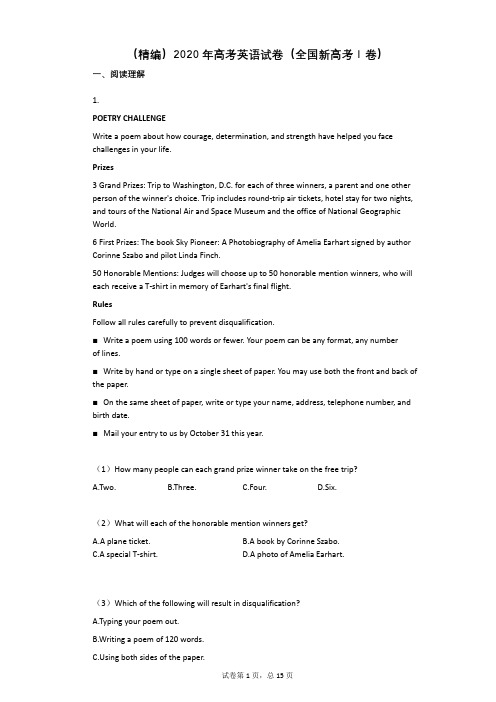
(精编)2020年高考英语试卷(全国新高考Ⅰ卷)一、阅读理解1.POETRY CHALLENGEWrite a poem about how courage, determination, and strength have helped you face challenges in your life.Prizes3 Grand Prizes: Trip to Washington, D.C. for each of three winners, a parent and one other person of the winner's choice. Trip includes round-trip air tickets, hotel stay for two nights, and tours of the National Air and Space Museum and the office of National Geographic World.6 First Prizes: The book Sky Pioneer: A Photobiography of Amelia Earhart signed by author Corinne Szabo and pilot Linda Finch.50 Honorable Mentions: Judges will choose up to 50 honorable mention winners, who will each receive a T-shirt in memory of Earhart's final flight.RulesFollow all rules carefully to prevent disqualification.■ Write a poem using 100 words or fewer. Your poem can be any format, any numberof lines.■ Write by hand or type on a single sheet of paper. You may use both the front and back of the paper.■ On the same sheet of paper, write or type your name, address, telephone number, and birth date.■ Mail your entry to us by October 31 this year.(1)How many people can each grand prize winner take on the free trip?A.Two.B.Three.C.Four.D.Six.(2)What will each of the honorable mention winners get?A.A plane ticket.B.A book by Corinne Szabo.C.A special T-shirt.D.A photo of Amelia Earhart.(3)Which of the following will result in disqualification?A.Typing your poem out.B.Writing a poem of 120 words.ing both sides of the paper.D.Mailing your entry on October 30.【答案】ACB【考点】应用文阅读细节理解广告布告类阅读【解析】本文是一篇应用文(征稿启事),介绍了诗歌邀请赛的奖励和参赛规则。
2020年高考英语试卷全国卷I(新课标Ⅰ)(word解析版)
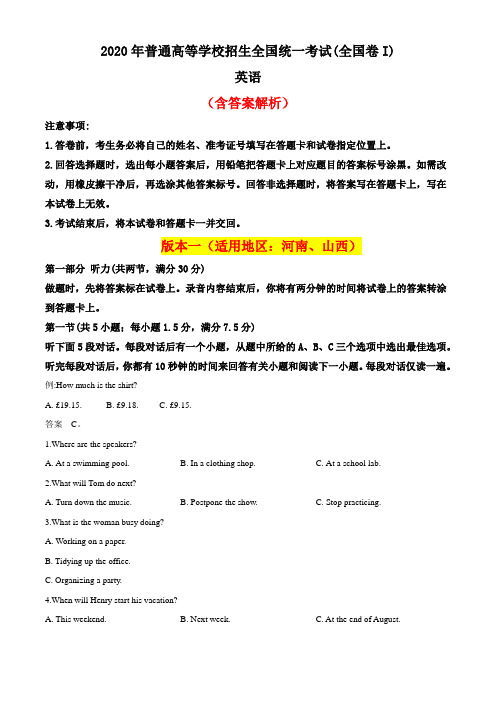
A. A restaurant.
B. A laundry.
C. A grocery store.
15. Which is included in the rent?
A. Electricity.
B. The Internet.
听下面一段较长对话,回答以下小题。
11 How did the man feel about his performance today?
A. Greatly encouraged.
B. A bit dissatisfied.
C. Terat did the man say helped him overcome the problem?
A. Forgiving.B. Sympathetic.C. Supportive.
10. What might Cathy do for the present company?
A. Apply for a project.B. Train a new person.C. Recommend an engineer.
C. Satellite TV.
16. What does the woman think of the apartment?
A. It’s quite large.
B. It’s well furnished.
C. It’s worth the money.
听下面一段独白,回答以下小题
17. Where is Jeff from?
A. Turn down the music.B. Postpone the show.C. Stop practicing.
2020年高考英语试题全国卷Ⅰ(word版,有答案)

绝密★启用前2020年普通高等学校招生全国统一考试(全国卷I)英语注意事项:1. 答卷前,考生务必将自己的姓名、准考证号填写在答题卡和试卷指定位置上。
2. 回答选择题时,选出每小题答案后,用铅笔把答题卡上对应题目的答案标号涂黑。
如需改动,用橡皮擦干净后,再选涂其他答案标号。
回答非选择题时,将答案写在答题卡上,写在本试卷上无效。
3. 考试结束后,将本试卷和答题卡一并交回。
版本一(适用地区:河南、山西)第一部分听力(共两节,满分30分)做题时,先将答案标在试卷上。
录音内容结束后,你将有两分钟的时间将试卷上的答案转涂到答题卡上。
第一节(共5小题;每小题1.5分,满分7.5分)听下面5段对话。
每段对话后有一个小题,从题中所给的A、B、C三个选项中选出最佳选项。
听完每段对话后,你都有10秒钟的时间来回答有关小题和阅读下一小题。
每段对话仅读一遍。
例:How much is the shirt?A. £19.15.B. £9.18.C. £9.15.答案是C。
1. Where are the speakers?A. At a swimming pool.B. In a clothing shop.C. At a school lab.2. What will Tom do next?A. Turn down the music.B. Postpone the show.C. Stop practicing.3. What is the woman busy doing?A. Working on a paper.B. Tidying up the office.C. Organizing a party.4. When will Henry start his vacation?A. This weekend.B. Next week.C. At the end of August.5. What does Donna offer to do for Bill?A. Book a flight for him.B. Drive him to the airport.C. Help him park the car.第二节(共15小题;每小题1.5分,满分22.5分)听下面5段对话或独白。
2020年高考英语真题试卷(附带答案及详细解析)

绝密★启用前2020年普通高等学校招生全国统一考试全国卷I英语注意事项:1、答卷前,考生务必将自己的姓名、准考证号填写在答题卡上:2、回答选择题时,选出每小题苦案后,用铅笔把答题卡上对应题目的答案标号涂黑,如需改动,用橡皮擦干净后,再选涂其他答案标号。
回答非选择题时,将答案写在答题卡上,写在本试卷上无效。
3.考试结束后,将本试卷和答题卡一并交回。
第一部分听力(共两节,满分30分)极超时,先将客案标在试卷上。
录音内容结束后,你将有两分钟的时间将试巷上的答案转涂到答题卡上。
一、听下面5段对话。
每段对话后有一个小题,从题中所给的A、B、C三个选项中选出最佳选项。
(共5小题;每小题1.5分,满分7.5分)(共5题;共7.5分)1.Where does the conversation probably take place?A. In a supermarket.B. In the post office.C. In the street.2.What did Carl do?A. He designed a medal.B. He fixed a TV set.C. He took a test.3.What does the man do?A. He's a tailor.B. He's a waiter.C. He's a shop assistant.4.When will the flight arrive?A. At 18:20.B. At 18:35.C. At 18:50.5.How can the man improve his article?A. By deleting unnecessary words.B. By adding a couple of points.C. By correcting grammar mistakes.二、听下面5段对话或独白。
